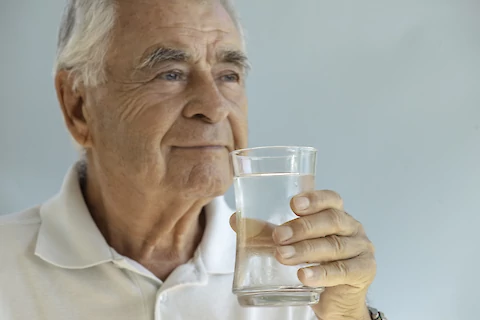
At Senior Helpers Berkeley, we believe in empowering our seniors and their caregivers with the right knowledge for a healthier, happier life. Good hydration is a cornerstone of health. Unfortunately, misconceptions abound, and the importance of hydration for seniors is often downplayed.
The truth is, staying hydrated is just as vital for our seniors as it is for the rest of us, if not more. Join us as we bust some common myths, establish the facts, and share some handy tips for keeping our seniors well-hydrated.
The Aging Process and Hydration
As we age, our bodies undergo various changes, some of which can affect our hydration levels. For instance, seniors often have a diminished sense of thirst, meaning that they may not realize when they're dehydrated.
Additionally, the body's ability to conserve water decreases as we get older, making seniors more susceptible to dehydration. Be on the lookout for common signs of dehydration in the elderly, such as dry mouth, fatigue, dizziness, and confusion.
Myths About Hydration in Seniors
One common myth suggests that seniors need less water. However, the Institute of Medicine recommends a daily water intake of about 2.7 liters for women and 3.7 liters for men – regardless of age.
Another misconception is that thirst is a reliable gauge of hydration needs. Given that seniors' sense of thirst can weaken over time, waiting until they're thirsty to drink water may not be enough to maintain adequate hydration.
A further myth claims that all fluids hydrate equally. While it's true that most fluids contribute to hydration, some, like alcohol and caffeinated drinks, can actually lead to dehydration.
Facts About Hydration in Seniors
Proper hydration is essential to the functioning of virtually all bodily systems. It helps to regulate body temperature, keep skin healthy, maintain cognitive function, and even prevent urinary tract infections.
Furthermore, dehydration in seniors can lead to severe health risks, including kidney stones, heatstroke, and urinary tract infections. A chronically dehydrated state can even increase the risk of falling, owing to dizziness and confusion.
Practical Tips for Ensuring Proper Hydration
Encouraging seniors to stay hydrated doesn't solely rely on increasing water intake. You can also help them to incorporate more fluids into their diet through foods with high water content. This can include fruits like watermelon and oranges or vegetables like cucumbers and tomatoes.
Make drinking water more enjoyable by adding a slice of lemon or a splash of juice. Also, consider investing in a good water bottle to have at their side throughout the day. Finally, keep an eye on changes in body weight, urine color, or energy levels, as these could indicate a need for more fluids.
Senior Helpers Can Help Ensure Proper Hydration
Adequate hydration cannot be underestimated for seniors. By debunking myths and understanding the facts about hydration, we arm ourselves with the knowledge necessary to ensure our loved ones stay healthy and hydrated.
Here at Senior Helpers Berkeley, we can help in supporting you and your seniors' health and wellness. If you are in Vallejo, Pinole, San Pablo, Kensington, or El Cerrito and need guidance or support for your senior's health, contact us - we're here to help!